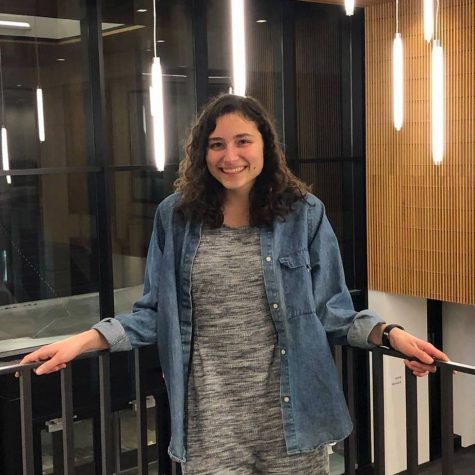Davis, Harris speak on black masculinity and femininity at BHM Symposium
February 27, 2020
On Saturday, Feb. 22, the Black History Month planning committee brought American studies professor Duchess Harris and local poet, musician and activist Joe Davis together for a symposium on black femininity and masculinity. Each gave separate presentations in the John B. Davis Lecture Hall and then took the stage together for a conversation moderated by psychology professor Morgan Jerald.
Harris opened the symposium with a presentation of her research from her book “Black Feminist Politics from Kennedy to Trump.”
“Presidential politics has always struggled with race, class and gender,” Harris said.
Harris has worked continuously on this research since she started it as her undergraduate capstone project. She began with a question: “what were Black women doing in 1963?” Only one woman — Daisy Bates, the adult leader of the Little Rock Nine — spoke at the March on Washington that year.
“The agenda of middle-class southern black men who were mostly Baptist ministers, who were also straight, had the platform,” Harris said.
Her research examines the evolution of black feminist movements through the decades, from the formation of the National Organization for Women and the Black Panther Party in the mid-1960s to the development of black women’s studies in acadamia and the entrance of Black women into politics.
She tried to publish the first edition of her book — “Black Feminist Politics from Kennedy to Clinton” — in 2001, but publishers were initially unreceptive. In the spring of 2008, when Hillary Clinton and Barack Obama were competing for the Democratic presidential nomination, publishers contacted her about publishing the book.
The political landscape has shifted significantly since the book’s first publication in 2009. Harris published the most recent edition during the 2018 midterm elections, covering the beginning of the Trump presidency in her research.
This presidency, she noted, is a unique point in recent political history.
“There’s always been a black woman on the presidential cabinet since the Kennedy administration, until we get to now,” Harris said.
Davis took the stage after Harris with a different angle. Davis’ work ranges in style and in purpose — he works in slam poetry, theater, dance and music. He presented a combination of video clips, speaking and slam poems.
Through his varied mediums of work, Davis focuses on healing at the intersections of race and gender.
“White supremacy patriarchy and unhealthy forms of masculinity, they do damage to all of us,” Davis said. “It dehumanizes me, it doesn’t allow me to access full humanity, it doesn’t give me the space to flourish holistically, and I’m forced to distort and shrink parts of myself.”
Art, Davis said, has been a valuable access point for thinking about and sharing these issues. He highlighted the importance of challenging images of the “one-dimensional black man” — media portrayals of black men as stereotypical caricatures.
“He can only be one thing at one time,” Davis said. “He always represents his entire race, unless he’s a doctor or a lawyer or a successful business professional — then he’s the exception.”
“Blackness is not a monolith. Masculinity is not a monolith,” he continued. “This is a call to practice showing up as our fullest and most authentic and best selves. Each and every day we show up.”
During the closing question and answer session, Harris and Davis brought their perspectives of political analysis and communal healing into conversation.
Theater professor Harry Waters, Jr. asked the presenters about how to better call on people to have these conversations. The audience, he noted, was mostly women.
“I think people have to recognize what’s at stake for them and why it matters for them to show up to this space, to this work,” Davis said. “When you have your reason, your ‘why,’ your motivation, you’re going to show up. You’re going to be part of that conversation.”
Harris said that people might expect these conversations to criticize men as individuals. This, she noted, is not the same thing as working to dismantle systems of racism and patriarchy.
“I think it’s really emotional,” Harris said. “I think that people are fearful, and I think people are expecting an indictment.”
Both noted that their work has a long way to go. Harris concurred with a review of her book that assessed it as “both heartening and disheartening.”
But Harris highlighted reasons to be hopeful for the future, too. She sees an evolution in political spaces for black women, made possible in part by recognition from black men.
“I think that the black men who were part of the Congressional Black Caucus in 1971 were not like the black men in 2020,” Harris said. “I think that [Davis’s presentation] is an indication that toxic masculinity is being addressed by this new generation in ways that are different… times have changed.”
Davis, too, noted that the young people he works with in his workshops bring a new perspective and a reason to be hopeful.
“I see where their heads are at, and I see where their hearts are at, and I’m like, ‘I wasn’t on that when I was your age,’ and that’s giving me hope for the future,” Davis said. “When I’m rooted and grounded in community and see people who are actually engaged in this work, who are impassioned and who care and who keep showing up… that gives me hope.”













